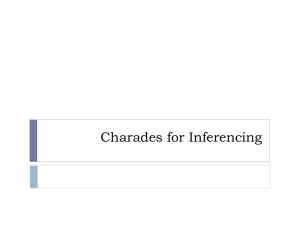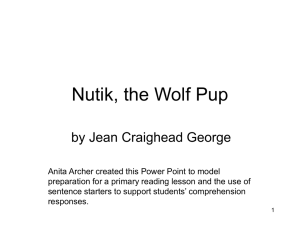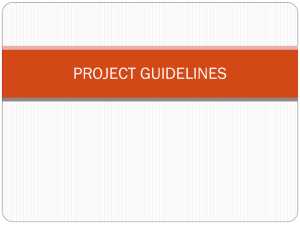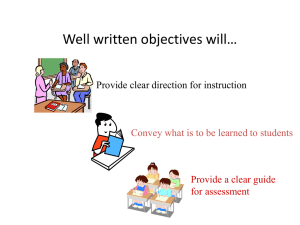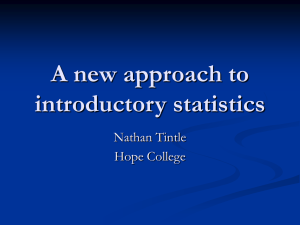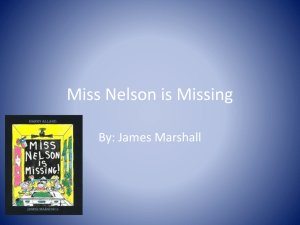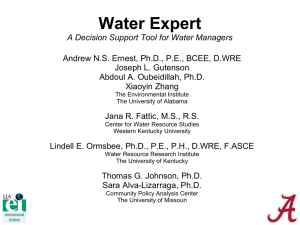Inference Rules
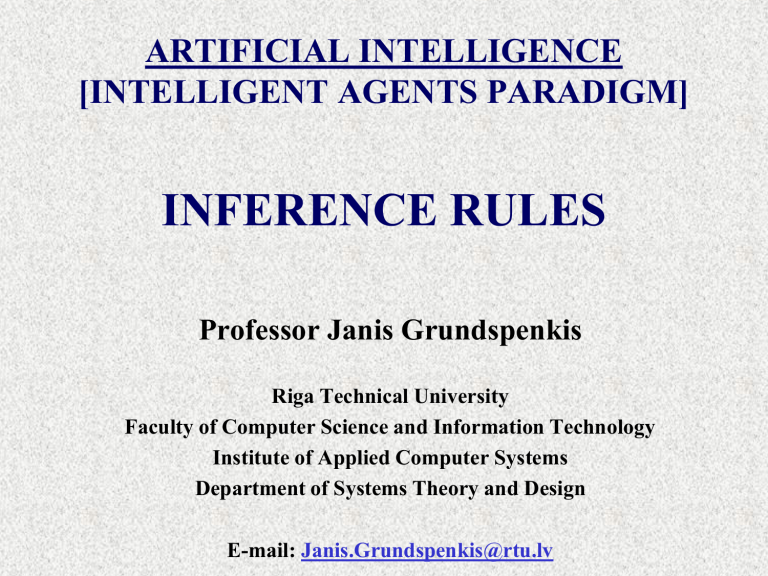
ARTIFICIAL INTELLIGENCE
[INTELLIGENT AGENTS PARADIGM]
INFERENCE RULES
Professor Janis Grundspenkis
Riga Technical University
Faculty of Computer Science and Information Technology
Institute of Applied Computer Systems
Department of Systems Theory and Design
E-mail: Janis.Grundspenkis@rtu.lv
Inference Rules
Modus Ponens or Implication Elimination
α
β, α
β
From two sentences
and
that are true
(so called axioms ) the new true sentence
can be concluded (a theorem is proved with respect to the axioms, i.e. the theorem logically follows from the axioms).
Inference Rules
Example :
Sentence : If sun shines it is warm
A
– “sun shines”;
B
– “it is warm”.
Axioms : A
B
A
Theorem : B
, i.e., “it is warm”.
Inference Rules
AND-Elimination
α
1
α
2
...
α n
α i
From a conjunction of sentences any of conjuncts can be inferred.
Inference Rules
AND-Introduction
α
1
α
1
,
α
α
2
2
, ...,
...
α
n
α n
From a list of sentences their conjunction can be inferred.
Inference Rules
OR-Introduction
α
1
α
2
α i
...
α n
From a sentence its disjunction with anything else at all can be inferred.
Inference Rules
Double-Negation Elimination
α
α
From a double negated sentence a positive sentence can be inferred.
Inference Rules
Unit Resolution
α
β,
β
α
From a disjunction, if one of the disjuncts is false it can be inferred that the other one is true .
Inference Rules
α
β,
β
α
γ
γ
or
equivalently
α
α
β, β
γ
γ
Since
cannot be both true and false , one of the other disjuncts must be true in one of the premises. Or equivalently, implication is transitive.
Inference Rules
Modus Tolens
α
β,
α
β
T T F F T
T F F T F
F T T F T
F F T T T or equivalently
α β(it is true),
β(it
α(it is true) is false)
Inference Rules
Abduction Rule
α
α
β, β
F
F
T
T
T
F
T
F
It is not a sound inference rule!
T
T
T
F
Inference Rules
PROOF THEORY AND PROCEDURE
The proof theory is a set of rules for logical inferencing the entailments of a set of sentences.
The way to prove a theorem is to use a proof procedure .
A proof procedure is a combination of an inference rule and an algorithm for applying that rule to a set of logical expressions to generate new sentences.
Inference Rules
PROOF PROCEDURE (continued)
Proof procedures use manipulations called sound rules of inference that produce new expressions from old expressions. More precisely, models of the old expressions are guaranteed to be models of the new ones too.
Inference Rules
PROOF PROCEDURE (continued)
The most straightforward proof procedure is to apply sound rules of inference to the axioms , and to the results of applying sound rules of inference, until the desired theorem appears .
Inference Rules
PROOF PROCEDURE (continued)
A logical proof consists of a sequence of applications of inference rules , starting with sentences initially in the knowledge base, and ending with the generation of the sentence whose proof is desired.
The job of an inference procedure is to construct proof by finding appropriate sequences of applications of inference rules.
